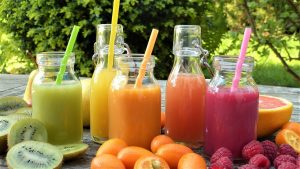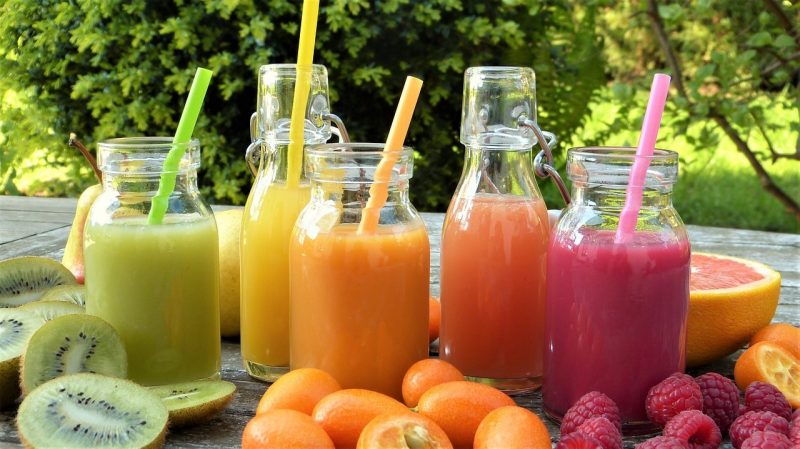 It’s pretty obvious that any juices or fruit smoothies containing added sugars are going to be relatively unhealthy due to the amount and type of added sugar, but what about fruit juice that has no added sugars and is squeezed purely from fruit?
It’s pretty obvious that any juices or fruit smoothies containing added sugars are going to be relatively unhealthy due to the amount and type of added sugar, but what about fruit juice that has no added sugars and is squeezed purely from fruit?
Is it okay to drink your daily fruit amount rather than eat whole fruits?
Store-bought vs Homemade Juice
There are two different kinds of “100% fruit juice”—the kind you buy at the store and the kind you make at home with a juicer or blender from whole fruits.
While they are very similar, there are also some differences that are important to discuss when determining whether or not fruit juice will be part of your diet.
Let’s begin by defining “100% fruit juice”. The US Code of Federal Regulations defines this as “juices directly expressed from a fruit or vegetable (i.e. not concentrated and reconstituted) shall be considered to be 100% juice and shall be declared as ‘100% juice.’”
Fruit juice contains many of the macro- and micronutrients as whole fruit with the exception of vitamin C, fiber and calcium.
One study discusses the various juicing processes in a commercial processing plant compared with home juicing. According to the this, when ripened fruits are juiced in a commercial processing plant, the micronutrients like phytonutrients and flavonoids that are in the seeds and peel are better transferred to the juice, allowing the content of the juice to be more similar to the whole fruit.
In a home juicer, this is not the case as so many of those micronutrients do not get transferred because of the difference in the juicing process.
Some recommend blending the fruits in a blender to gain access to more fiber, but according to certain nutritionists, this may not be as viable an option as it sounds because the blades of the blender break down the fiber, and the heat produced from the blades is thought to damage other key nutrients.
Sugar content
There is more to consider, however, than just the nutrient content.
When you juice a fruit and then consume it, you are bypassing the body’s natural response to whole or solid food consumption.
The sugar in the juice is very quickly and easily absorbed into the body which does not give your body a feeling of satiety.
This means you will still be hungry even after consuming the number of calories provided by the fruit juice.
Because most of what you are consuming is the sugar from the fruit, you will experience a “sugar high” from your body’s blood-glucose levels spiking which will demand a release of insulin to regulate this spike.
This leads to a sugar high crash and cravings shortly after. More often than not, you will crave something sweet which starts the glucose-spike/insulin release cycle all over.
This becomes damaging to the body over long periods of time.
Can you really only drink one glass?
Some studies have found that people who drink an age- and energy-appropriate amount of fruit juice better fulfill daily fruit and vegetable recommendations.
According to the 2010 Dietary Guidelines for Americans, the age-appropriate amounts are 4-6oz per day for kids 1-6 years old and 8-12oz per day for kids 7-18 years old.
Current studies that suggest that kids consuming these amounts do not experience increased body weights compared to kids who do not consume fruit juice; the issue comes in controlling the amount consumed.
Fruit juice, whether store-bought or homemade, is going to be sweet.
Many people, especially kids, tend to prefer sweet foods and drinks which can make it difficult to stick to the recommended amounts.
For example, one cup of orange juice can contain the juice of 4-6 oranges.
It is highly unlikely that you would eat that many whole oranges in one sitting, meaning that in just one glass, you are consuming significantly more sugar and fewer micronutrients to offset the sugar content.
If you choose to drink more than the recommended amount, then you have added that much more sugar to your diet.
In addition to adding more calories to your diet, your body will actually burn fewer calories than if you had eaten a whole piece of fruit.
When you eat solid food, the body burns up to 200 calories per day during the process of chewing, absorbing and digesting that food.
With liquids bypassing these mechanisms, your body will burn fewer calories while intaking more calories.
Other side effects
Not only are you adding more sugar into the diet without allowing the body the opportunity to access the full nutrient value of fruits, but dentists are also concerned about the effects that consuming fruit juice can have on teeth enamel.
Fruits that are used for juicing tend to be more acidic and can wear away at the enamel on the teeth if they are consumed on a regular basis.
Acid erosion has become an area of concern for children. Some surveys reveal that a whopping 30% of twelve-year-olds show some signs of enamel erosion.
So what should you do?
When it comes to whether or not 100% fruit juice should be part of your diet, there are a few things to consider.
If you can access them, it is best to consume whole fruits instead of fruit juices.
Whole fruits are better when it comes to the way they are metabolized by the body.
If there is a reason that you are unable to choose whole fruit over fruit juice, drinking one glass of the recommended amount of fruit juice may be a temporary and infrequent option.
If you are going to consume fruit juice, there are some that have been shown to have better health impacts than others.
While orange and apple juices are the most commonly chosen, cranberry juice has been proven in studies to be beneficial to the body’s urinary tract health.
Overall, when your typical diet is full of whole, nutrient-dense foods, you will not need to “supplement” your fruit intake with fruit juice.
Instead of choosing to add fruit juice to your daily food regimen, try mixing up the variety of fruits you choose to avoid monotony in the diet while adding a wider range of beneficial and necessary micronutrients.
Besides fruit juices, Energize Max is a good alternative for having all the necessary vitamins, minerals and nutrients with stevia as the sweetener.
Get Enegize Max With End of Summer Special! –
About the Author:
Emma Deangela is the best selling author of The Alkaline Diet Program and 80/20 Fat Loss. She has helped over tens of thousands of men and women to lose weight and transform their health with sound nutrition advice. Learn how you can lose weight fast – How to lose weight by adding these alkaline foods.
What kind of fruit juice do you drink?
Please share with your friends this article on the Fruit Juice – Use any of the social media and email buttons on the left of our website.


Leave a Reply